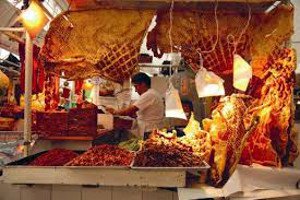 le make their way through the twisting aisles of one of Mexico City’s largest street markets on a Sunday morning, customers fight for room to peruse everything from blenders to mobile phones to jeans.
le make their way through the twisting aisles of one of Mexico City’s largest street markets on a Sunday morning, customers fight for room to peruse everything from blenders to mobile phones to jeans.These shoppers are choosing cheaper, tax-free, used or contraband merchandise over visiting shopping malls or department stores like Sears, owned in Mexico by billionaire Carlos Slim’s Grupo Sanborns . Competition from so-called informal vendors is part of the reason Mexico’s retail association reported an increase of only 0.7 per cent in same-store sales in July, missing the 1 per cent average increase estimate of analysts compiled by Bloomberg.
Retailers are seeing growth slacken as Latin America’s largest economy after Brazil struggles to pull consumer sentiment and spending out of the doldrums. Gross domestic product will rise as much as 2.8 per cent this year, down from a previous forecast of 3.3 per cent, the central bank said last week. This means retailers are unlikely to see a significant pickup in annual sales growth until next year, when confidence improves, said Banco Ve Por Mas SA analyst Juan Elizalde.
"The informal economy is one of the main competitors to these department stores,” Elizalde said in a phone interview. “The clients are evaluating the new reality of their pockets, and it’s much cheaper to buy used appliances at a market, if it’s good quality, than pay it by installments in Elektra or Famsa," he said. He was referring to two other retailers, Grupo Elektra SAB -- owned by billionaire Ricardo Salinas -- and Grupo Famsa SAB.
Prehispanic Times
Mexico’s culture of street vendors and open-air markets dates back to prehispanic times, when vendors sold clothing and commodities at a tianguis -- a word still used today for itinerant markets that pop up once a week in different Mexico City neighborhoods.
The Mexican retail association complains that informal vendors are more likely to traffic in stolen or pirated goods. While some vendors get their products from wholesale markets, such as Mexico City’s Supply Center for produce and other food, the National Chamber of Cargo Trucking estimated that 8 per cent of informal goods are stolen from trucks.
While government officials have attempted for decades to move people to the formal economy, including clearing streets of vendors, the practice remains stubbornly entrenched. Almost six out of 10 people labored in Mexico’s informal sector as of June, according to the national statistics center.
The off-the-books businesses can help employ people who are struggling to feed their families. About 45.5 per cent of Mexicans were below the poverty line as of 2012, according to the latest data from Coneval, a government institute that evaluates public policy.





